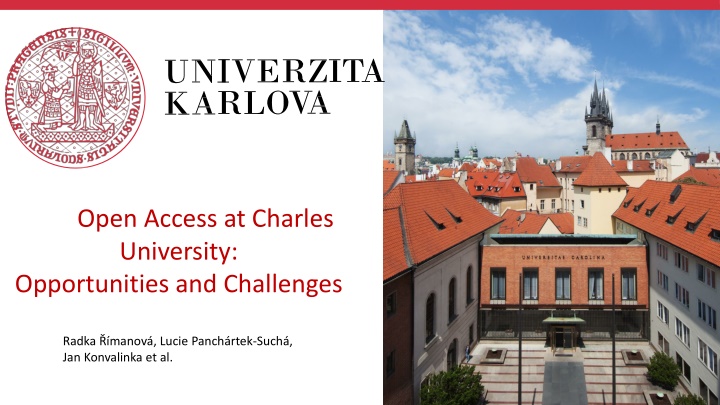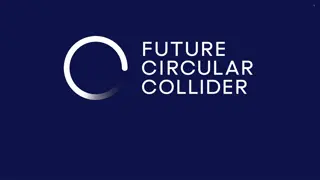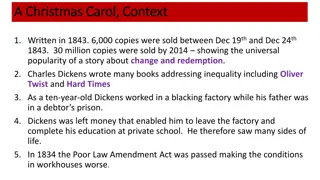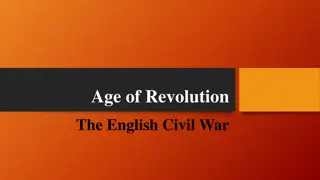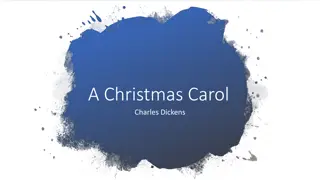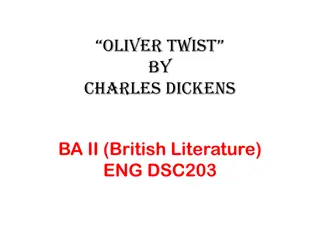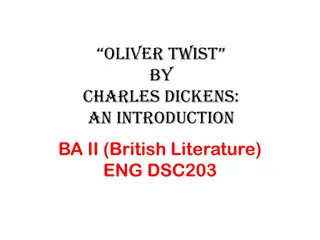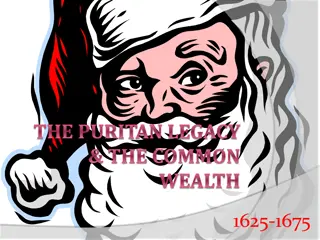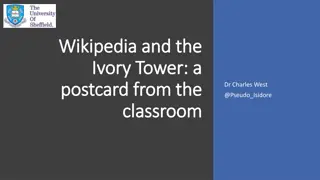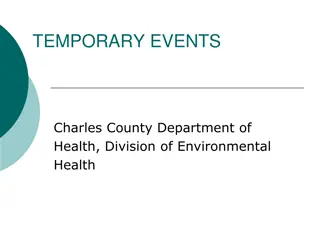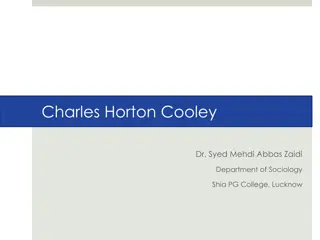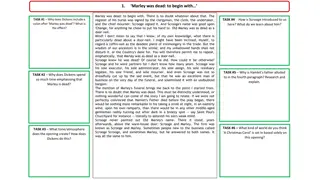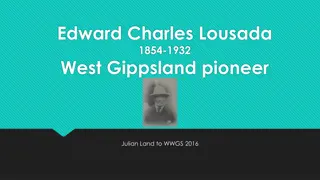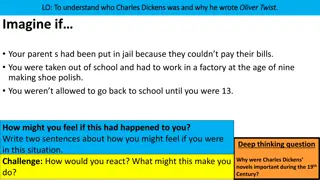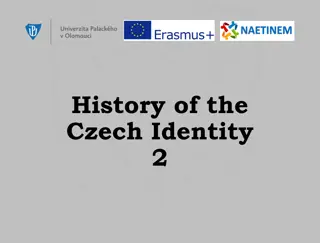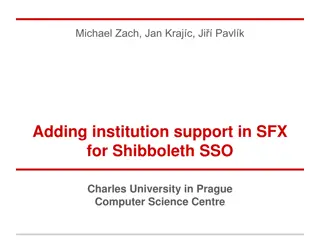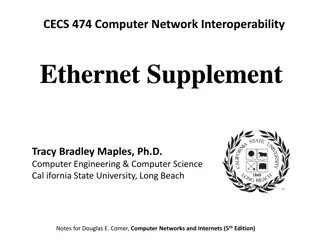Open Access at Charles University: Opportunities and Challenges
Charles University is navigating the landscape of open access following the implementation of the Czech National Open Access Strategy. The university is working towards making all research articles and proceeding papers open access, monitoring article processing charges, and promoting open access as a preferred publishing model. Various initiatives are underway to enhance open access practices at Charles University, including the creation of an optimal environment for the development of open access publishing with a focus on the Karolinum Press and other faculty publishers.
Download Presentation

Please find below an Image/Link to download the presentation.
The content on the website is provided AS IS for your information and personal use only. It may not be sold, licensed, or shared on other websites without obtaining consent from the author.If you encounter any issues during the download, it is possible that the publisher has removed the file from their server.
You are allowed to download the files provided on this website for personal or commercial use, subject to the condition that they are used lawfully. All files are the property of their respective owners.
The content on the website is provided AS IS for your information and personal use only. It may not be sold, licensed, or shared on other websites without obtaining consent from the author.
E N D
Presentation Transcript
About Charles University Open Access at Charles University: Opportunities and Challenges Radka manov , Lucie Panch rtek-Such , Jan Konvalinka et al.
Czech National Open Access Strategy Full name: The Czech Republic National Strategy of Open Access to Scientific Information for 2017-2020 Approved by the Government of the Czech Republic in June 2017 Requires open access... The strategy is very general, without specific requirements and goals, mostly describing the current (2016/17) state The Action Plan for the Implementation of the National Strategy was legally adopted by the Government on April 29, 2019 (planned date: December 31, 2017) KRECon 2019: Open Access Seeking balance, November 2019 2
How will the Action Plan affect Charles University? Main impacts: Starting 1 July 2020, CU will have to make all research articles and proceeding papers open access. CU will have to start to systematically monitor all paid article processing charges (OA publishing fees, or APCs). CU authors will have to have ORCID identifiers (which should be part of metadata records sent to the national CRIS system IS VaVaI). Although the AP does not cover open data, CU should be prepared for the next stage it is to be expected that the future national research policy will contain an open data policy. KRECon 2019: Open Access Seeking balance, November 2019 3
Current state of open access at Charles University KRECon 2019: Open Access Seeking balance, November 2019 4
Open Access at CU Charles University signed the Berlin Declaration on Open Access to Knowledge in Sciences and Humanities in 2013 and so has confirmed its participation in the open movement. In 2017 the Declaration of Charles University Academic Senate and university management on open access policy at CU was published and further steps will follow. KRECon 2019: Open Access Seeking balance, November 2019 5
Implementation of the CU Declaration Planned steps (according to the Declaration) Current state (to November 2019) Central Library will provide methodical guidance and information on open access (OA). Fulfilled; see Central Library website Special OA librarian position will be created in all faculty libraries. Partially fulfilled; see Central Library website University CRIS system will allow users to add full texts of publications to the metadata record. In progress since 2018 CU Institutional Repository will be prepared in accordance with OpenAIRE guidelines. In progress since 2018 Legal analysis of employee works - qualified counseling for academics Fulfilled; 17/2018, 46/2018 a 47/2018 All projects supported by CU funding bodies (e.g. GAUK etc.) should promote OA as preferred publishing model. - Optimal environment for further development of OA publishing will be set up for Karolinum Press and other faculty publishers. Partially fulfilled; Karolinum Press and FA Press KRECon 2019: Open Access Seeking balance, November 2019 6
and how open is CU now? OA publishing is mainly an individual / voluntary activity or a requirement from external funders. Green OA Voluntary and often outside the CU infrastructure In subject specific repositories, general purpose repositories like Zenodo Gold OA Voluntary or mandatory but thanks to policies defined outside CU by funding bodies H2020 (EC), Czech Health Research Council, KRECon 2019: Open Access Seeking balance, November 2019 7
How open is CU according to WoS*? In Web of Science, there are 12,941 records ("Article" and "Proceedings Paper") under "Charles University Prague" for 2016-18, of which 4,937 have been identified by WoS as open access (i.e., 38%): Green OA = 48 % ( Green Accepted + Green Published WoS categories) Gold OA = 40 % ( DOAJ Gold + Other Gold WoS categories) Bronze OA = 12 % ( Bronze WoS category) The most open fields according to data for 2016-18 from WoS are: Physics Particles Fields (766) Astronomy Astrophysics (474 Multidisciplinary Sciences (421) Physics Nuclear (260) Biochemistry Mollecular Biology (191) * Data valid as of November 1, 2019 KRECon 2019: Open Access Seeking balance, November 2019 8
Another view on the openness at the CU: open access increases the citation rate According to the Open Access - Global Trends and Rankings application, 26 % of CU publications are OA. 9 KRECon 2019: Open Access Seeking balance, November 2019
What needs to be done? Challenges of Open Access at Charles University KRECon 2019: Open Access Seeking balance, November 2019 10
Changes needed at institutional level Technical infrastructure: Creating a stable CU Institutional Repository for publications Connecting the CU Institutional Repository to international (and national?) infrastructures e.g. OpenAIRE, future (?) national OA content aggregator, etc. Political steps Directive on the CU level requiring authors to comply with the OA principles. Introducing OA conditions into internal grants and competitions. Supporting steps Introducing the position of a university OA coordinator Creation of a stable network of open access faculty coordinators Preparation of supporting legislative and methodological materials/instructions. + all changes and activities should also cover research data (at least in the pilot version) KRECon 2019: Open Access Seeking balance, November 2019 11
Green or Gold? Two possible open access roads KRECon 2019: Open Access Seeking balance, November 2019 12
Green OA model would mean for CU Prerequisite: The need to build a stable and functional infrastructure Impact: Increase time-related/technical difficulties to report results (in addition to metadata, it would be necessary to store full texts as well as to attach license agreements) Benefit: Securing (often delayed) OA within CU infrastructure Benefit: Ensuring long-term archiving (and thus access) to your own publication production Benefit/opportunity: The possibility to extend the infrastructure to other types of outputs (e.g. research data) and link them with publications KRECon 2019: Open Access Seeking balance, November 2019 13
Gold OA model would mean for CU Prerequisite: The need to negotiate sound and sustainable conditions Impact: Increase (at least during the transitional period) of information costs (access publication) Benefit: Ensuring immediate OA, but with publishers (as a result, a stable institutional infrastructure for green OA is needed long-term archivation) KRECon 2019: Open Access Seeking balance, November 2019 14
Funding of OA publishing From our perspective, one of the main challenges in the field of OA is the lack of funds for a full transformation to gold open access. According to a study from Max Planck Digital Library, there are enough resources in the current publishing system to transfer from the subscription-based model to gold open access. However KRECon 2019: Open Access Seeking balance, November 2019 15
It is very difficult to estimate exactly how much the Gold OA would cost us. KRECon 2019: Open Access Seeking balance, November 2019 16
One of possible estimations... According to CU CRIS, CU authors produced 20 044 journal articles in 2016-18, 8 222 as corresponding authors the average annual number is 2 741. Charles University paid approx. 19 mil. CZK for 489 OA articles in 2016-18 the average cost of 1 APC could then be 39 000 CZK. So,... hypothetical annual costs on OA publishing at CU could be: 2 741 * 39 000 CZK = 106 mil CZK But CU currently pays 58 mil CZK per year for journal subscriptions (from and out of CzechELib) + approx. annual cost on APCs. This shows that CU lacks approx 47 mil CZK (=1,9 mil EUR*) for the transformation to gold open access. * Rate to October 31, 2019: 1 EUR = 25,510 CZK KRECon 2019: Open Access Seeking balance, November 2019 17
Points to keep in mind We cannot calculate accurate costs estimation because... APCs are not universal, prices differ title to title and are changing all the time Not all corresponding authors are also paying authors Not all open access journals charge APCs (e.g. platinum OA journals, journals allowing the green OA model) Real (future) prices could be decreased by offset deals, membership discounts etc. KRECon 2019: Open Access Seeking balance, November 2019 18
Changes needed at national level Clear OA as well as ORD policy with mandatory goals and terms (in National Research, Development and Innovation Policy for 2021+?) Offset deals (APCs + fair conditions for green open access) OA and ORD in terms and conditions of national funding bodies OA and ORD should be required; potential costs on OA/ORD publishing (e.g. APCs) must be eligible In the future, to address financing OA publishing of postgrant publications (e.g. special fund like EC/OpenAIRE FP7 Post-Grant Open Access Pilot). KRECon 2019: Open Access Seeking balance, November 2019 19
Why are some researchers reluctant? Why are some researchers reluctant? The Dangers and Concerns (real or conceived) Financial concerns (there are no free lunches someone will have to pay for it, and it will be us anyway) Bureaucratic way of transforming the publishing models (directives and deadlines might lead to closing certain important publishing avenues) Nationwide vs European vs global action (we need American publishers on board as well) Danger of introducing wrong motivations for authors and publishers (publishing poor research for profit, predatory publishing) Access for less developed countries (institutes) for publishing their papers Facebookisation of science publishing (free content might lead to the floods of rubbish, as it happened with newspapers and magazines); hierarchy of data sources (prestige, reliability, authority) has to be retained KRECon 2019: Open Access Seeking balance, November 2019 20
Why are some researchers reluctant? Why are some researchers reluctant? The Dangers and Concerns (real or conceived) Financial concerns (there are no free lunches someone will have to pay for it, and it will be us anyway) Bureaucratic way of transforming the publishing models (directives and deadlines might lead to closing certain important publishing avenues) Nationwide vs European vs global action (we need American publishers on board as well) Danger of introducing wrong motivations for authors and publishers (publishing poor research for profit, predatory publishing) Access for less developed countries (institutes) for publishing their papers Facebookisation of science publishing (free content might lead to the floods of rubbish, as it happened with newspapers and magazines); hierarchy of data sources (prestige, reliability, authority) has to be retained Profit is not a dirty word, free market is great and communism does not work 21
We believe in change Increasing the visibility of CU scientific results (publications and data) Equal access to scientific information for CU students and staff Enhancement of the internal infrastructure by functionality of the repository Possibility to monitor alternative metrics for our research publication Keeping up with international scholarly communication standards KRECon 2019: Open Access Seeking balance, November 2019 22
Summary To take advantage of the opportunities, CU (and all other research institutions) needs to provide the academic community with the maximum possible support in: Technical Infrastructure Politics&methodology Financial aspects Open access initiative needs political support at the national, European and even global level. KRECon 2019: Open Access Seeking balance, November 2019 23
Thank you for your attention (and keep fingers crossed) KRECon 2019: Open Access Seeking balance, November 2019 24
